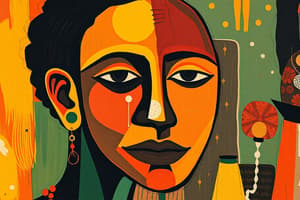Podcast
Questions and Answers
What stage of self-development involves internalizing the perspectives of others through role-play?
What stage of self-development involves internalizing the perspectives of others through role-play?
- Self-reflection stage
- Play stage (correct)
- Game stage
- Language stage
According to Mead, which aspect of self refers to the unsocialized and spontaneous part of an individual?
According to Mead, which aspect of self refers to the unsocialized and spontaneous part of an individual?
- Self
- Me
- Ego
- I (correct)
How does language contribute to self-development according to Mead?
How does language contribute to self-development according to Mead?
- By promoting social isolation
- By enabling conformity to societal norms
- By limiting individual expression
- By allowing expression and comprehension of thoughts (correct)
Which of the following describes the 'Me' in Mead's theory of self?
Which of the following describes the 'Me' in Mead's theory of self?
What type of social group is characterized by members joining out of shared self-interest?
What type of social group is characterized by members joining out of shared self-interest?
During which self-development stage do individuals begin to adhere to societal rules?
During which self-development stage do individuals begin to adhere to societal rules?
What is a disadvantage of rootedness in social groups?
What is a disadvantage of rootedness in social groups?
In Mead's framework, what role does imaginative play serve in social development?
In Mead's framework, what role does imaginative play serve in social development?
What is one of the major characteristics of modernity according to Giddens?
What is one of the major characteristics of modernity according to Giddens?
How does sociology define the development of self-identity?
How does sociology define the development of self-identity?
Which type of social group is primarily influenced by family connections and is common in traditional societies?
Which type of social group is primarily influenced by family connections and is common in traditional societies?
What is dynamism characterized by in modern society?
What is dynamism characterized by in modern society?
Which of the following best describes a social network?
Which of the following best describes a social network?
What does capitalism involve as a characteristic of modernity?
What does capitalism involve as a characteristic of modernity?
What role do social groups play in a person's social development?
What role do social groups play in a person's social development?
Which of the following is NOT true about modern societies?
Which of the following is NOT true about modern societies?
What term describes the self that is conscious and available for immediate reflection?
What term describes the self that is conscious and available for immediate reflection?
Which of the following best illustrates the concept of self as a mental representation that changes contextually?
Which of the following best illustrates the concept of self as a mental representation that changes contextually?
According to cultural psychologists, the independent construct of the self is primarily found in which type of cultures?
According to cultural psychologists, the independent construct of the self is primarily found in which type of cultures?
Which aspect of the self is influenced by genetic maturation, learning, and cultural factors?
Which aspect of the self is influenced by genetic maturation, learning, and cultural factors?
Katherine Ewing described the self as encompassing which of the following?
Katherine Ewing described the self as encompassing which of the following?
What main aspect differentiates individualistic cultures from collectivistic cultures in terms of self-concept?
What main aspect differentiates individualistic cultures from collectivistic cultures in terms of self-concept?
Which of the following statements reflects the idea that self-representations can rapidly change without the individual realizing it?
Which of the following statements reflects the idea that self-representations can rapidly change without the individual realizing it?
Cultural anthropologists argue that the self is shaped by what aspects?
Cultural anthropologists argue that the self is shaped by what aspects?
Flashcards are hidden until you start studying
Study Notes
Anthropology
- The self is learned by incorporating new experiences into existing memories.
- Anthropology studies people in their cultural contexts, exploring human evolution and differences.
- The self is not static, it is constantly evolving through genetic maturation, learning, forgetting, stress, aging, and disease.
- The self is an illusion—a series of self-representations constructed from cultural concepts of personhood and personal memories.
- Different self-representations emerge depending on the context, creating an illusion of wholeness and continuity despite shifts in identity.
- The self is culturally shaped and variable, influenced by cultural traditions and social practices.
- The self is constructed in two ways: independent and interdependent constructs.
- Independent constructs, common in individualistic cultures, emphasize separateness, individuality, and internal attributes.
- Interdependent constructs, common in collectivistic cultures, emphasize interconnectedness, conformity, and social roles.
Developing the Self
- Mead outlined three stages of self-development: language, play, and game.
- Language: Individuals develop the capacity to express themselves and understand others through shared symbols and gestures.
- Play: Role-playing allows individuals to internalize perspectives and develop an understanding of how others feel.
- Game: Individuals learn societal rules and perspectives, prioritizing them to achieve success and win "the game."
Two Sides of Self
- The self consists of two components: "I" and "Me."
- "I": The unsocialized, spontaneous aspect of the self, driven by impulses and creativity.
- "Me": The product of learned behaviors, attitudes, and social expectations, responsible for social control and adherence to rules.
Sociology
- Sociology studies social life, social change, and the social causes and consequences of human behavior.
- Socially formed norms, beliefs, and values become internalized, contributing to self-identity.
- Pre-modern society focused on survival, with limited choices in social structures and behaviors.
- Modernity is characterized by industrialism, capitalism, surveillance, and dynamism.
- Social groups are comprised of two or more individuals interacting, sharing characteristics, and identifying with the group.
- Social networks are the connections and ties between individuals within a social group.
- Organic groups are naturally occurring, prevalent in traditional societies, and based on family ties and organic motivations.
- Rational groups are based on shared interests and individual choices, forming in modern societies with diverse populations.
- Rational groups are motivated by "interest change." When interests change, group membership can change.
- Social network connections in rational groups tend to be tenuous, lacking a sense of meaningful connection between members.
Studying That Suits You
Use AI to generate personalized quizzes and flashcards to suit your learning preferences.




